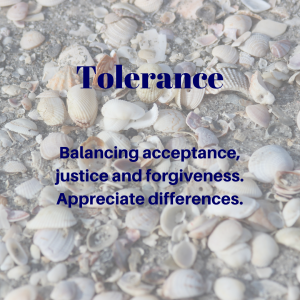
Tolerance

Description
Tolerance helps us accept differences and frees us from being judgmental. It recognizes that everyone has feelings, needs, hopes, and dreams. Tolerance is an appreciation for diversity, whether of culture or temperament. It leads to unity. It is being patient and forgiving when others make mistakes while calling on discernment to know when to stand up for justice. Tolerance is accepting things that we wish were different with humor and grace. It allows us to embrace the pain and joys of life.
In Family Life
Tolerance within a family is a beacon of understanding and harmony. It manifests as a genuine respect for each member’s unique perspectives, beliefs, and choices, even when they differ from one’s own. Tolerance fosters an environment where disagreements are approached with patience and a willingness to find common ground, demonstrated through open and empathetic communication. It means recognizing that diversity of thought can enrich the family’s collective wisdom and nurture individual growth.
In practicing tolerance, family members embrace each other’s quirks and idiosyncrasies, creating a nurturing and accepting home where love and acceptance reign supreme.
Quote
“Everything that irritates us about others can lead us to an understanding of ourselves.”
— Carl Jung
The Practice of Tolerance
- I appreciate differences.
- I free myself from prejudice.
- I refrain from judging myself or others.
- I forgive mistakes.
- I accept what I cannot change.
- I balance acceptance with justice.
Balancing Tolerance
To maintain a balanced tolerance, several virtues come to the rescue:
-
-
- Courage: Courage is the antidote to excessive tolerance. It empowers individuals to stand up for justice, confront wrongdoing, and assert their values when needed. It ensures that tolerance does not translate into passivity in the face of injustice.
- Discernment: Discernment helps individuals differentiate between situations where tolerance is appropriate and instances where intervention is necessary. It ensures that tolerance is not indiscriminate but directed towards the right causes.
- Empathy: Empathy enables individuals to put themselves in others’ shoes, fostering a deeper understanding of different perspectives and experiences. It encourages tolerance by helping individuals relate to the feelings and struggles of others.
- Patience: Patience complements tolerance by allowing individuals to gradually acclimate to diverse viewpoints and cultures. It ensures that the acceptance process is not rushed, allowing understanding and harmonious coexistence to flourish.
-
Striking this balance enables us to celebrate our shared humanity while honoring the beautiful diversity that enriches our lives.
